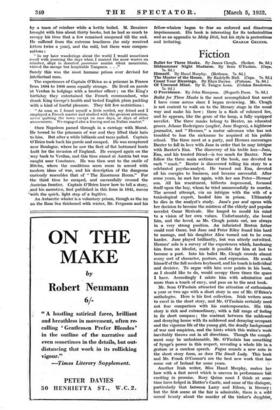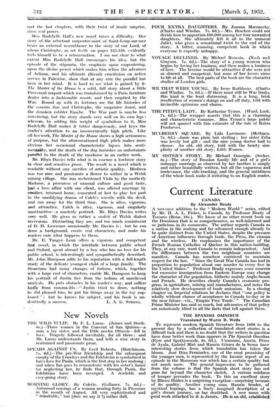Fiction
Himself. By Hazel Murphy. (Methuen. 7s. 6d.) 78. 6d.) 0 Providence. By John Hampson. (Hogarth Press. Is. Od.)
Ballet for Three Masks is the most accomplished first novel I have come across since I began reviewing. Mr. Cleugh is not content to walk on to the literary stage in the usual way and make his bow ; there is a flash of coloured fire, and he appears, like the genie of the lamp, a fully equipped novelist. The three masks belong to Baxter, an educated grocer, Jehane Rodmiguez (anglice, Jane Rogers), a highbrow journalist, and "Hermes," a motor salesman who has not troubled to lose the nickname he acquired at his public school. The three meet at a party, and Hermes encourages Baxter to fall in love with Jane in order that he may intrigue with Baxter's Ems. The discovery of his treble loss—Jane, Ena, and his trusted friend—is too much for Baxter. Now follow the three main sections of the book, one devoted to each "mask." Baxter is discovered telling his story to a celebrated psycho-analyst. Be turned out Ena, devoted all his energies to business, and became successful. After some years, he met her again, with her son Peter—Hermes' son. All his resentment, hitherto impersonal, focussed itself upon the boy, whom he tried unsuccessfully to murder. The second attempt, via an intrigue with the wife of a toxicological expert, landed him in prison. Ultimately he dies in the analyst's study. Jane's pas seal opens with her decision to become the mistress of the elderly and popular novelist Oscar hierivale. She longed to mould his mind to a vision of her own values. Unfortunately, she loved him, and the loved, as Mr. Cleugh points out, are always in a Very strong position. An infuriated Breton father could rout Oscar, but Jane and Peter Riley found him hard to manage, and his daughter Alice turned out to be even harder. Jane played brilliantly, but was utterly outwitted. Hermes' solo is a survey of the experiences which, hardening him from an idealist, made it possible for him at last to become a poet. Into his ballet Mr. Cleugh crowds almost every sort of character, posture, and expression. He avails himself of the full modern keyboard, and his touch is individual and decisive. To argue with him over points in his book, as I should like to do, would occupy three times the space I have. Accordingly I salute him with admiration and more than a touch of envy, and pass on to the next book.
Mr. Sean O'Faolain attracted the attention of enthusiasts a year or two ago with a short story in one of Mr. O'Brien's anthologies. Here is his first collection. Irish writers seem to excel in the short story, and Mr. O'Faolain certainly need not fear comparison with his contemporaries. His title story is rich and extraordinary, with a full range of feeling in its short compass ; the contrast between the mildewed and decaying house with its mildewed and decaying occupant and the vigorous life of the young girl, the deadly background of war and suspicion, and the hints which this writer's work inevitably throws out in all directions. Though the compli- ment may be unfashionable, Mr. O'Faolain has something of Synge's power in this respect, revealing a whole life in gesture or a careless speech. Fugue sounds a new note in the short story form, as does The Small Lady. This book and Mr. Frank O'Connor's are the best new work that has come out of Ireland for some years.
Another Irish writer, Miss Hazel Murphy, makes her bow with a first novel which is uneven in performance hilt exciting in promise. Rory Quinn must I think at some time have lodged in Hatter's-Castle, and some of the dialogue, particularly that between Larry and Eileen, is literary ; but the first scene at the fair is admirable, there is a wild unreal beauty about the murder of the tinker's daughter,
and the last chapters, with their twist of ironic surprise, show real power.
Miss Radclyffe Hall's new noi;e1 raises a difficulty. Her story of the reluctant carpenter-saint of Saint-Loup-sur-mer bears an external resemblance to the story of our Lord, of whom Christophe, as set forth- on pages 135-138, evidently feels himself to be a reincarnation. I am not clear to what extent Miss Radclyffe Hall encourages his idea, but the episode of the stigmata, - the emphasis up-on carpentering, upon the divine power which makes him refuse the advances of Aeliana, and his ultimate (literal) crucifixion on active service in Palestine, show that at any rate the parallel has been in her mind. It is hard to see what is gained by it The Master of the House is a solid, full story about a little Provencal seaport which was transformed by a Paris furniture dealer into a fashionable resort, and then emptied by the War. Bound up with its fortunes are the life histories of the cousins Jan and Christophe, the carpenter Raise, and the drunken cobbler Eusebe. The War part is maybe less convincing, but the story stands very well on its own legs:: rvherens, by adding this weight of symbolism to it, Miss lRadelyffe Hall makes it totter dangerously, and keys the reader's attention to an inconveniently high pitch. Like all her work, The Master of The House shows a high seriousness of purpose, but the aforementioned high pitch makes more obvious her occasional characteristic lapses into senti- . mentality, and the death of the dog furnishes an unfortunate parallel to the death of the racehorse in an earlier work.
Mr. Rhys Davies tells what is in essence a lowbrow story in clear and sensitive prose. The result is a novel which is readable without any sacrifice of artistic quality. Blodwen was too rare and passionate a flower to wither in a Welsh mining village. She was rechristened Viola by the motherly Madame, a procuress of unusual culture and good taste, had a love affair with one client, was offered marriage by imather, returned home, consented at last to play her part in the unedifying drama of Caleb's wrestle with the devil, and ran away for the third time. She is alive, vigorous, and attractive. Caleb is alive, vigorous, and singularly unattractive—a masterly portrait. Mr. Rhys Davies writes very well. He gives us rather a surfeit of Welsh dialect inversions. Distracting they are, and too much reminiscent of D. II. Lawrence occasionally Mr. Davies is ; but he can draw. a background, create real characters, and make his readers care what happens to them.
Mr. E. Tangye Lean offers a vigorous and competent fire novel, in which the interlude between public school and Oxford, spent abroad by a boy who has no love for his public school, is interestingly and sympathetically described. Mr. John Hampson adds to his reputation with a full-length study of the delicate youngest child of a large gamily. The Stonetrms had many changes of fortune, which, together with a large cast of characters, enable Mr. Hampson to keep his portrait of Justin free from the tedium of unrelieved analysis. He puts obstacles in his reader's way, and suffers badly from comma-itis—" Justin tried to draw, nothing he did pleased him, he put his things away in the toy cup- board " : but he knows his subject, and his book is un- doubtedly a success. L. A. G. STRONG.



















































 Previous page
Previous page